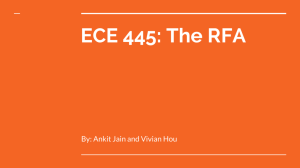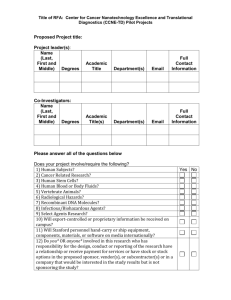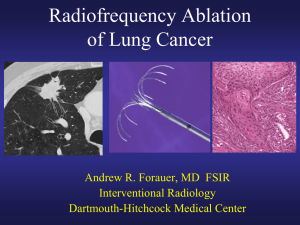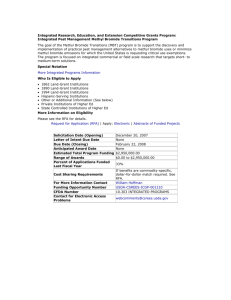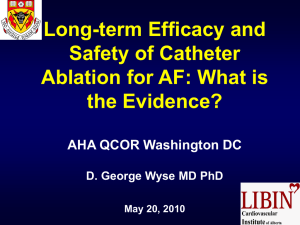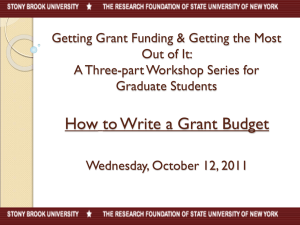RFA Overview
advertisement
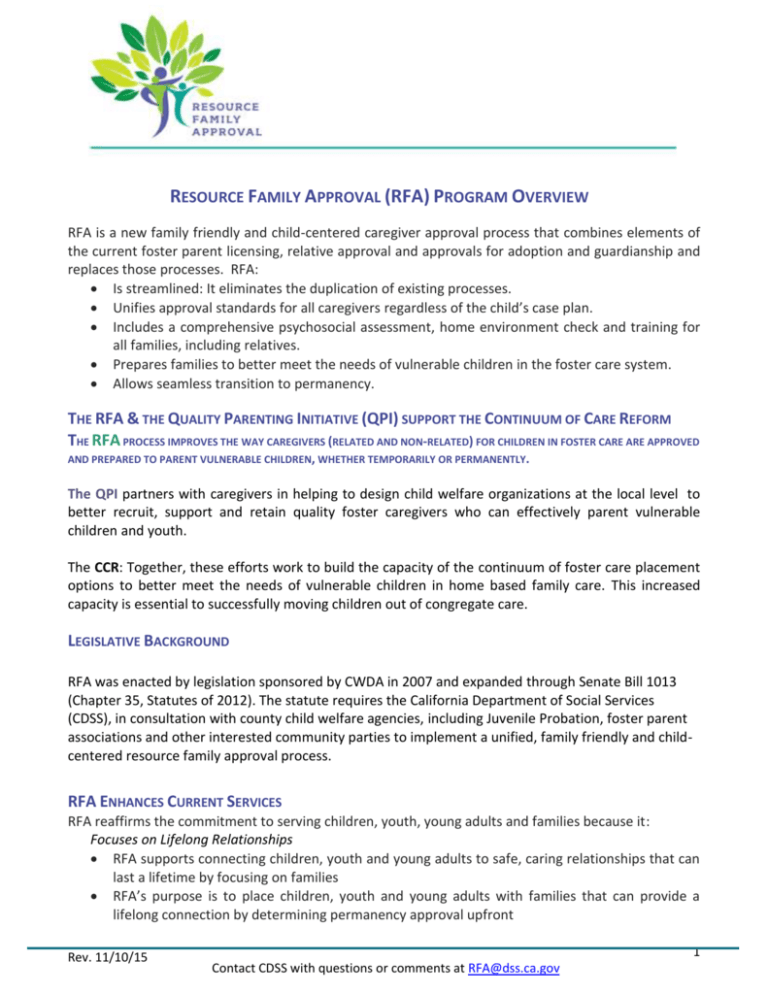
RESOURCE FAMILY APPROVAL (RFA) PROGRAM OVERVIEW RFA is a new family friendly and child-centered caregiver approval process that combines elements of the current foster parent licensing, relative approval and approvals for adoption and guardianship and replaces those processes. RFA: Is streamlined: It eliminates the duplication of existing processes. Unifies approval standards for all caregivers regardless of the child’s case plan. Includes a comprehensive psychosocial assessment, home environment check and training for all families, including relatives. Prepares families to better meet the needs of vulnerable children in the foster care system. Allows seamless transition to permanency. THE RFA & THE QUALITY PARENTING INITIATIVE (QPI) SUPPORT THE CONTINUUM OF CARE REFORM THE RFA PROCESS IMPROVES THE WAY CAREGIVERS (RELATED AND NON-RELATED) FOR CHILDREN IN FOSTER CARE ARE APPROVED AND PREPARED TO PARENT VULNERABLE CHILDREN, WHETHER TEMPORARILY OR PERMANENTLY. The QPI partners with caregivers in helping to design child welfare organizations at the local level to better recruit, support and retain quality foster caregivers who can effectively parent vulnerable children and youth. The CCR: Together, these efforts work to build the capacity of the continuum of foster care placement options to better meet the needs of vulnerable children in home based family care. This increased capacity is essential to successfully moving children out of congregate care. LEGISLATIVE BACKGROUND RFA was enacted by legislation sponsored by CWDA in 2007 and expanded through Senate Bill 1013 (Chapter 35, Statutes of 2012). The statute requires the California Department of Social Services (CDSS), in consultation with county child welfare agencies, including Juvenile Probation, foster parent associations and other interested community parties to implement a unified, family friendly and childcentered resource family approval process. RFA ENHANCES CURRENT SERVICES RFA reaffirms the commitment to serving children, youth, young adults and families because it: Focuses on Lifelong Relationships RFA supports connecting children, youth and young adults to safe, caring relationships that can last a lifetime by focusing on families RFA’s purpose is to place children, youth and young adults with families that can provide a lifelong connection by determining permanency approval upfront Rev. 11/10/15 1 Contact CDSS with questions or comments at RFA@dss.ca.gov Achieves Results for Children, Youth, Young Adults and Families Upfront training and ongoing services prepare caregivers to meet the needs of children, youth and young adults and assisting families with forming lifelong relationships Supportive and loving long-term relationships lead to stable permanent placements and improved outcomes for children, youth and young adults Improves Efficiency RFA is a streamlined process that includes one application, one background check and a combined home environment and permanency assessment The new coordinated process will eliminate duplication, reduce paperwork and maximize the efficient use of staff and system resources RFA IMPLEMENTATION RFA has been implemented in five counties, San Luis Obispo, Kings, Santa Barbara, Santa Clara and San Francisco. The second cohort of RFA counties; Stanislaus, Orange, Modesto, Butte, Yolo, Ventura and Monterey will begin implementation in 2016. All counties must be implemented by January 2017. The early implementing counties continue to be instrumental in working with CDSS to shape the RFA program. For a list of county contacts, please refer to the table below. LAUNCHING RFA IN YOUR COUNTY When launching RFA in your county, please refer to the resources below: Work through the Implementation Assessment to determine whether your county may be ready to launch RFA as part of the second cohort of counties and develop a plan for implementation. http://calswec.berkeley.edu/toolkits/resource-family-approval-rfa Review Welfare and Institutions Code Section 16519.5 http://www.leginfo.ca.gov Review more information about RFA http://www.childsworld.ca.gov/PG3416.htm Email your questions or comments to CDSS at RFA@dss.ca.gov Contact early implementation counties for more information. See the table above for contact information COUNTY Cohort 1 San Luis Obispo Kings County Santa Barbara Santa Clara San Francisco Rev. 11/10/15 CONTACT NAME (RFA CHILD WELFARE/PROBATION) CONTACT INFORMATION Linda Belch Tom Milder (probation) Susan Turner Kelly Zuniga (probation) Amy Kruger Wendy Stanley (probation) Tracy Bowers Giap Le (probation) Sophia Isom lbelch@co.slo.ca.us tmilder@co.slo.ca.us Susan.turner@ca.kings.ca.us Kelly.zuniga@ca.kings.ca.us a.kruger@sbcsocialserv.org wstanle@co.santa-barbara.ca.us tracy.bowers@ssa.sccgov.org Giap.le@pro.sscgov.org Sophia.isom@sfgov.org LAUNCH DATE 11/01/13 01/15/14 03/01/14 07/31/14 08/01/14 2 Contact CDSS with questions or comments at RFA@dss.ca.gov Lisa Smith (probation) Lisa.smith@sfgov.org Lisa.muller@cws.state.ca.us Dan.fruchtenicht@yolocounty.org Joanne.munro@ssa.ocgov.com Fermin.sanchez@prob.ocgov.com sboston@buttecounty.net 01/01/16 Butte Lisa Muller Dan Fruchtenicht (probation) Dr. Joanne Munro Fermin Sanchez (probation) Shelby Boston Monterey Karen Clampitt Clampittk@co.monterey.ca.us 03/01/16 Madera Elizabeth Inman Chris Childers (probation) Juanita Holguin (probation) Marisela Cabral-Centeno Sandra Carillo (probation) Nenita Dean Olivia Lopez(probation) Elizabeth.inman@co.madera.ca.us cchilders@madera-county.com Juanita.holguin@ventura.org 03/01/16 Marisela.cabral-centeno@ventura.org Sandra.carrillo@ventura.org Deanne@stancounty.com lopezol@stancounty.com 03/01/16 Cohort 2 Yolo Orange Ventura Stanislaus Rev. 11/10/15 01/01/16 03/01/16 04/01/16 3 Contact CDSS with questions or comments at RFA@dss.ca.gov
